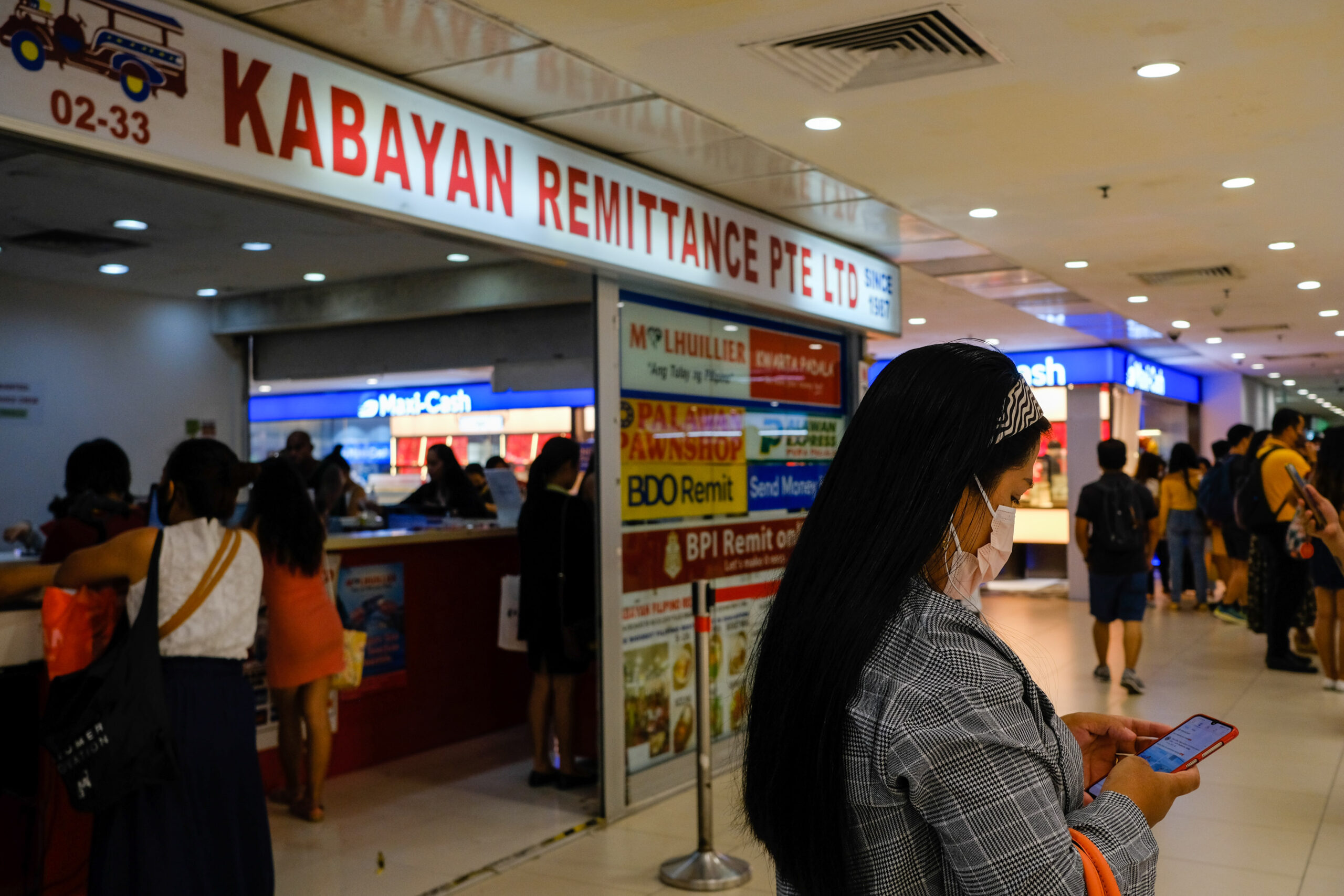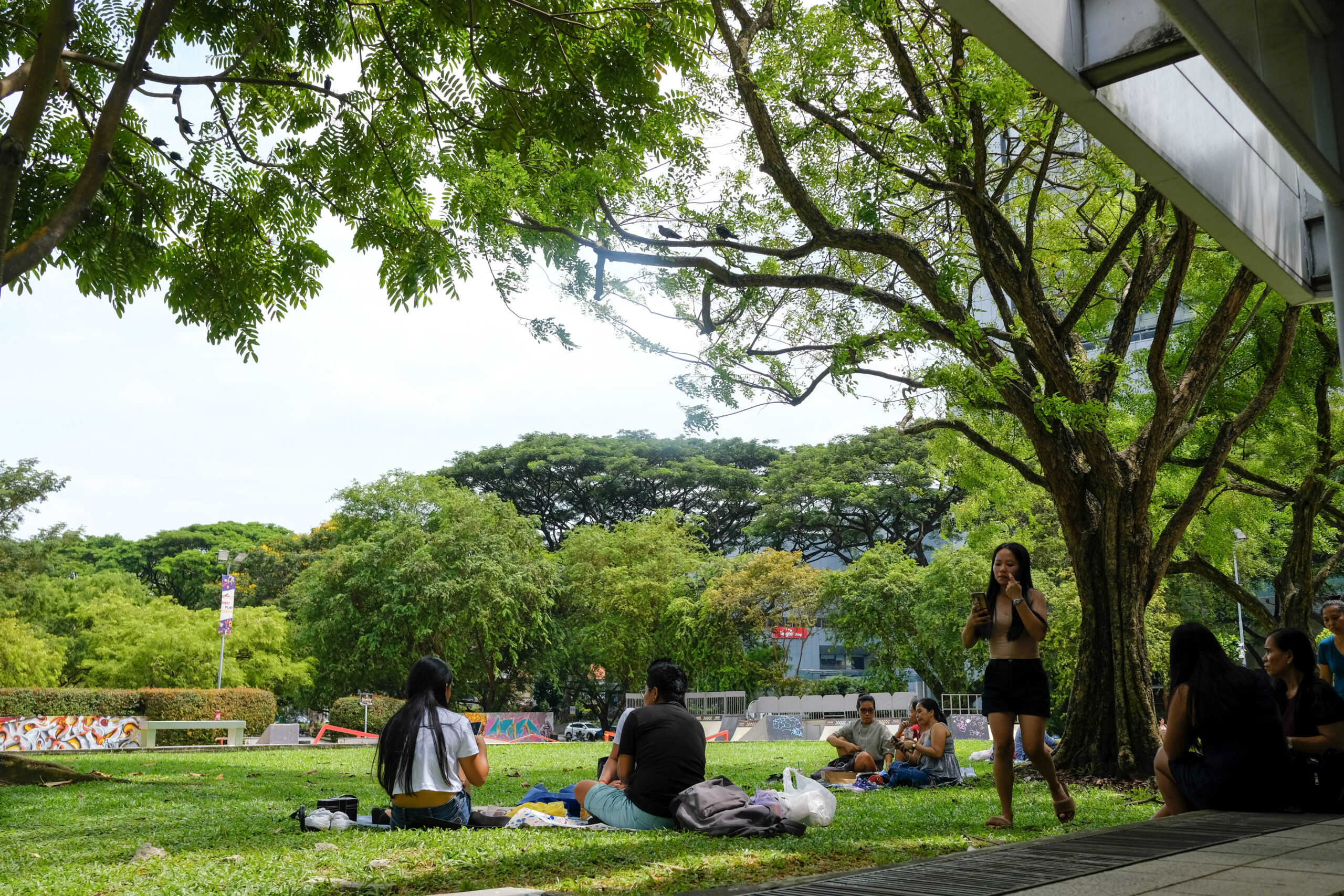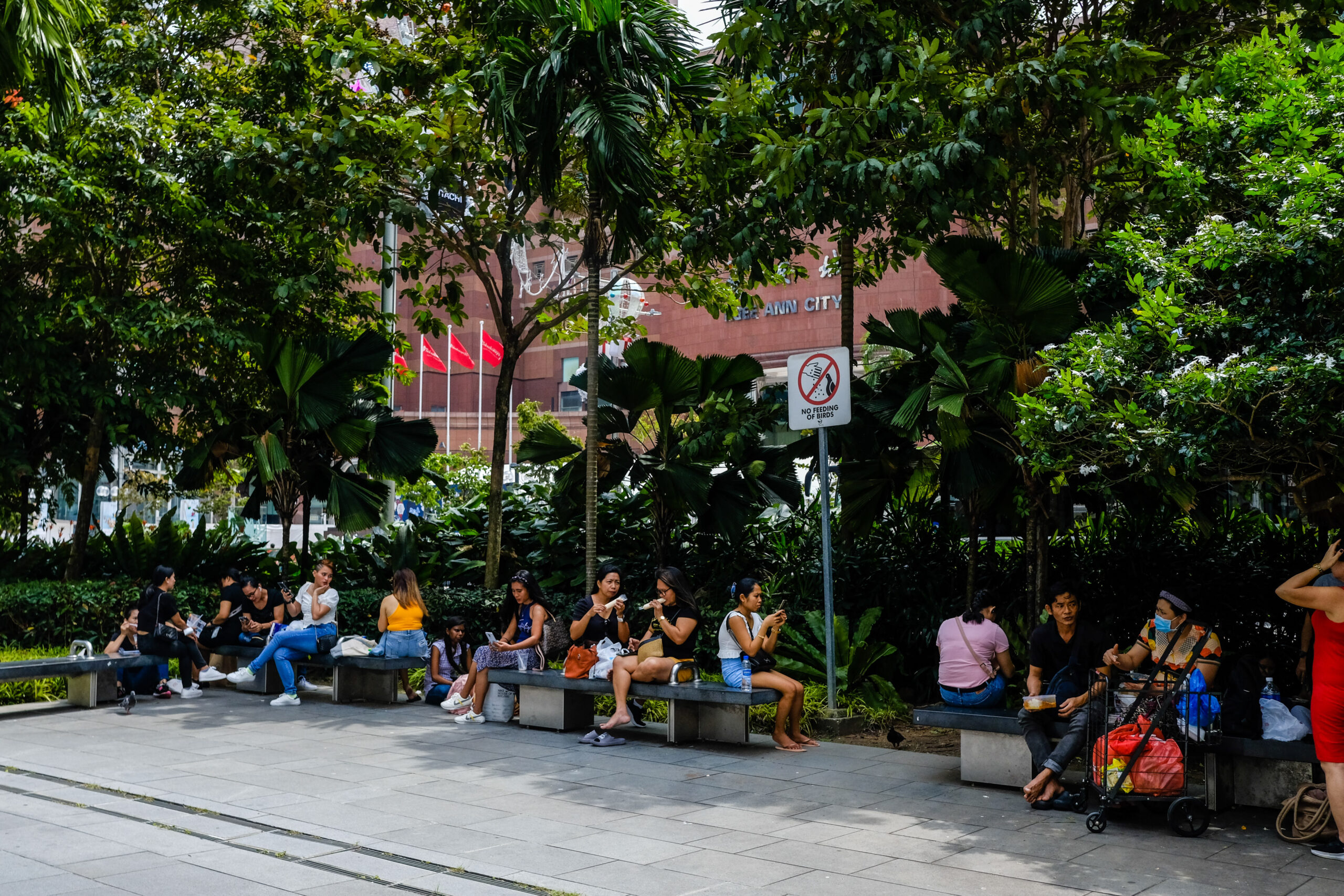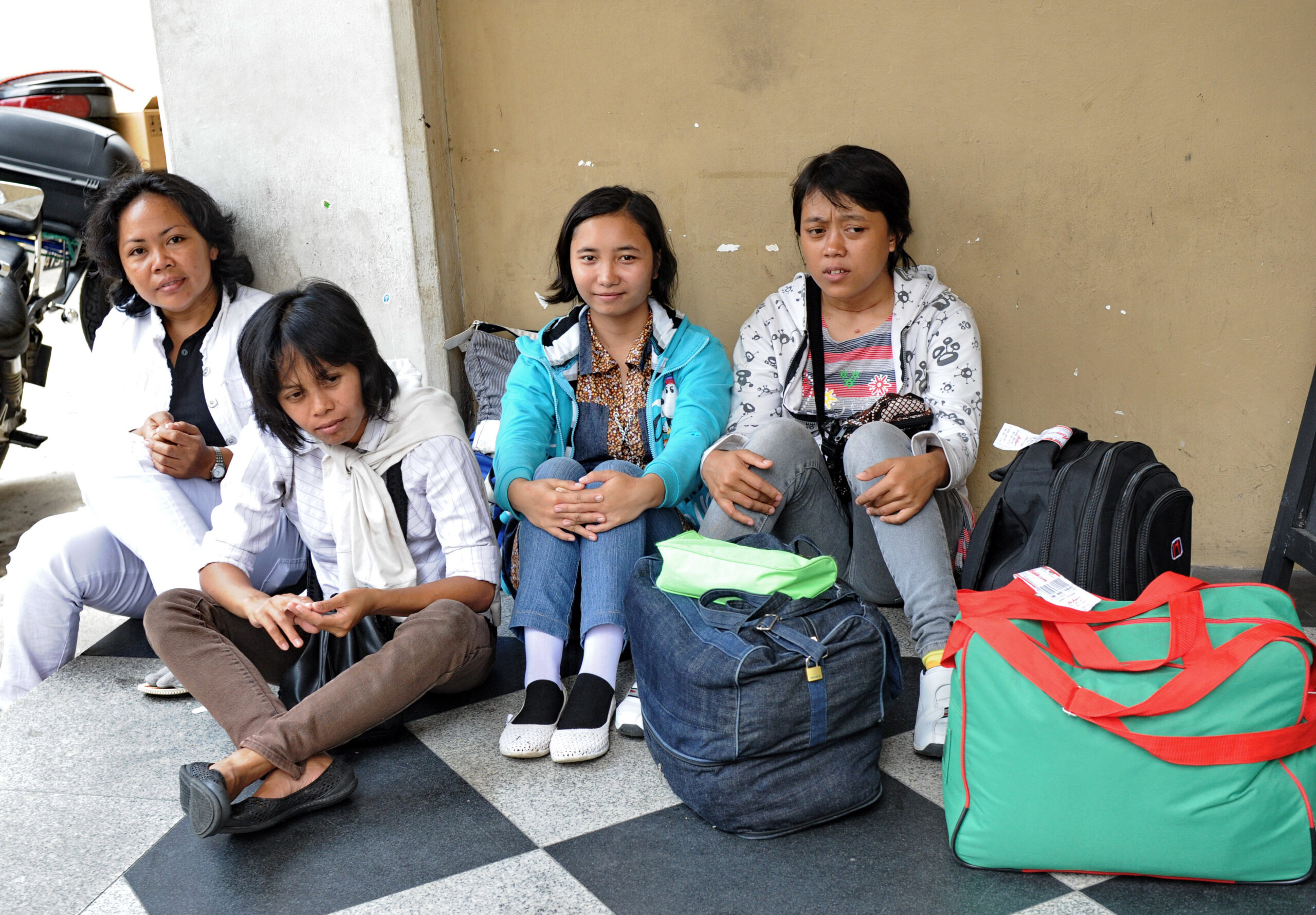Adelia* feels like she’s constantly being watched. The Filipino domestic worker works in a three-room flat in one of Singapore’s public housing buildings in northern Singapore. Her every move is observed, under the gaze of at least five surveillance cameras placed throughout the apartment.
From 5am to midnight, she’s on her feet. Preparing breakfast, doing the laundry, cleaning, and fetching her employer’s young toddler to and from kindergarten.
Her employer doesn’t like it when she’s idle, pressuring her to “find things to do” to keep herself occupied even when many tasks have already been completed. Often her boss gets angry at her, snapping at her for the smallest things, telling her to work faster, that “she isn’t good enough”, and that she’s “useless.”
The majority of the abuse is verbal, but once, her employer pushed her into a train cabin. Adelia was hit by the closing train doors and for three days felt a constant pain in her shoulder.
Because of the cameras, her employer knows every time Adelia stops for a rest. She can view the security footage in real time on her phone, and if she sees Adelia not doing anything, she’ll call on her handphone, barking down the phone to remind her to get back to work. The toilet is the only place Adelia can take a short break.
I need to do my job perfectly. Everything I do, she’s always looking at me.”
Adelia, migrant domestic worker
“When I was new here, I didn’t feel comfortable… I’m always thinking that there’s a CCTV looking at me so I need to do my job perfectly. Everything I do, she’s always looking at me. I feel even though she’s not at home, she’s in front of me. It’s a very stressful feeling, like I’m always being watched and controlled,” she says.
Adelia hasn’t had a day off since she came to work as a domestic worker in Singapore in July. By the time she is allowed to rest, at 11pm, her family in the Philippines is already fast asleep. She earns a salary of $440 (SGD $620) a month, which has been deducted for the first three months since she arrived. Fees charged to migrant domestic workers for immigration from their home country to settle in Singapore are recovered in a loan owed to the employer. The employer will deduct these costs from the MDW’s monthly salary.
But a new law that kicks in in January 2023 might offer her and fellow foreign domestic workers some reprieve.

Migrant domestic workers (MDWs) are often subject to long hours, mistreatment and little reprieve from the hard labour and working conditions. Currently, they are entitled to one rest day a week, which can be compensated in-lieu if the worker agrees to work on her rest day.
But in a long-awaited move, the Ministry of Manpower (MOM) announced that from 1 Jan 2023, migrant domestic workers will receive at least one rest day a month that cannot be deducted from their pay.
This arrangement will allow domestic workers to rest and recharge from work and form networks of support outside the household, experts say.
“The rest day becomes all the more significant and important,” Jaya Anil Kumar, senior research and advocacy manager at the Humanitarian Organization for Migration Economics (HOME) told the Globe.
“Having the chance to separate themselves from the workplace is very important. Many workers also need a rest day to find avenues to seek help,”
There are some 256,300 migrant domestic labourers working in the country, as of June 2020. But the demand could rise to 300,000 migrant domestic workers by 2030, due to an ageing population and number of households where both spouses are working.
Many workers also need a rest day to find avenues to seek help”
Jaya Anil Kumar, senior research and advocacy manager, Humanitarian Organization for Migration Economics (HOME)
These workers, widely referred to as “maids,’ form a crucial part of the everyday fabric in Singapore. They fill in crucial care gaps in households as live-in domestic workers complete household duties and caregiving to the young and elderly.
They also contribute a sizeable amount to Singapore’s economy — nearly US$8.2 billion (S$11.1 billion) in 2018, or 2.4%.
According to the Ministry of Manpower (MOM), announced in October, this new rest day can be taken as one full day, or two half-days. Migrant domestic workers can choose to spend the rest day at home, and defer the rest day by up to one month.
First announced last July, the policy comes after years of lobbying by activists, after a horrific maid abuse case where Burmese domestic worker Piang Ngaih Don was deprived of food and rest, tortured and beaten to death. It shed light on the vulnerable group of migrant domestic workers, whose plight is largely invisible to the private sphere of their employers’ households.
Singapore saw an average of 270 reports of abuse involving migrant domestic workers being made to the police each year between 2017 and 2020.
The new law is expected to go some way in stamping out abuse of migrant domestic workers and strengthening protections for them.

Tired of the endless drudgery, Adelia contacted HOME to seek advice on her situation in mid-October.
“I contacted HOME because I just want to ask for help because I am not comfortable here anymore and so tired but they advised me to finish my loan first and I think I don’t have any choice, I need to stay here,” she told the Globe.
After receiving guidance, her first three months of salary are still being deducted, so it might be easier for her or HOME to negotiate the transfer after the loan repayment period, she was told by the helpdesk representative.
And if she requests for a switch to another employer, she faces another conundrum. In the case of transfers, employment agencies may deduct another month’s salary. She also fears the next employer could be even worse, so instead of leaving, she decided to stay on.
“I feel like I have no freedom, I feel like I’m in prison,” Adelia said.
In a 2015 HOME report, which HOME published in 2015, researchers found that out of almost 800 migrant domestic workers surveyed, only slightly more than half had a weekly day off.
Even though a weekly day off was legislated in 2012, a significant number of migrant domestic workers who approach HOME for assistance still do not have rest days, Kumar explained.
Having the chance to separate themselves from the workplace is very important. Many workers also need a rest day to find avenues to seek help.”
In response to a parliamentary question posed, about 20% of MDWs agreed to be compensated in lieu of all their rest days at the point of work permit application, which is a substantial figure, Kumar said.
“These foreign domestic workers live and work in their employer’s houses, often in isolation, some with restricted access to mobile phones, clocking in 16-hour days and doing back-breaking work,” she added.
Other measures include post-placement checks by employment agencies, random house visits by MOM and in-person checks done by the Centre for Domestic Employees (CDE). The CDE is a non-governmental organisation set up by the National Trades Union Congress.
Besides conducting migrant domestic worker interviews on behalf of MOM, CDE also has a 24-hour helpline and organises activities such as handicrafts creation, day trips to places of interest, and hands-on workshops on weekends to encourage the workers to spend their rest day fruitfully.

But according to Kumar, while the checks may go some way in seeding out “egregious forms of abuse”, there’s a chance that cases might fall through the cracks.
In cases where checks are done over call, the employer could be standing behind the employee restricting them from speaking out about poor working conditions.
“A worker may think, ‘If I say anything that gets my employer in trouble, am I guaranteed re- employment or will I be sent back home?” Kumar said.
Labour rights groups say there also needs to be stronger action taken by employment agencies. Some agents may tell the domestic worker to continue with the contract despite ill-treatment.
“They treat the employer as their primary client, as opposed to the worker, when it should be equal,” Kumar said.
HOME suggests that Singapore should move towards having live-out options so working hours can be better regulated. There also needs to be more alternative care models and affordable home-based support services, so the burden doesn’t solely fall on domestic helpers, Kumar added.

In October, the MOM also released an online pamphlet that shared more details about the policy. According to the guide, “Different households have their own unique needs, employers and migrant domestic workers should openly discuss their respective needs and mutually agree on the rest day arrangements.”
In response, Transient Workers Count Too (TWC2) was blunt, calling out the guide as “permissive mush.”
TWC2 exco member Christine Pelly describes the language as “vague,” but also stresses a toxic power dynamic exists between the labourers and employers.
“We all know there’s a huge power imbalance between a helper and the family she works for,” Pelly said. “We have workers who come here indebted, paying off the loan, the agent fee, supporting a needy family back home, their job and salary they earn is their overwhelming concern. And they work in an environment where their choices are severely limited by debt and pressing commitments.”
There is no clear definition of a rest day, or clear number of hours of rest. Under the MOM’s official rest day guide’s “useful tips”, there is only a vague mention that most employers provide their migrant domestic workers with at least eight hours of continuous break, said Pelly.
She also pointed out there is no clear mention of the consequences against employers who fail to comply with this new rule. And foreign domestic workers often fear complaining to the agency as this may risk cancellation of their work permits.

“Phrases like ‘mutual agreement’ show that there’s inadequate appreciation of the reality of the situation where the migrant worker is disempowered and doesn’t have much of a voice,” Pelly said.
Bernard Menon, director of the Migrant Workers Segment at NTUC, told the Globe that they are supportive of the policy as they believe that migrant domestic workers deserve sufficient rest time to rejuvenate and be productive when doing their jobs.
“We hope that this mandatory one day of rest every month, as part of the weekly rest days, will help MDWs keep a positive outlook and maintain a healthy atmosphere in their employers’ homes,” he added.
Non-compliance of this mandatory rest day will be a breach of the Employment of Foreign Manpower (Work Passes) Regulations, he said.
But while efforts are put into place to ensure the policy will be enforced, a lot of uncertainty still swirls over how far it will go.
“This is an arrangement between employers and their MDWs as stipulated by MOM guidelines. We encourage employers and MDWs to have healthy conversations to share their views, thoughts, and concerns on their arrangements,” said Menon.
For the last 15 years, Filipino domestic helper Floraida Valle Peralta has been caring for Kara, a 17-year-old girl with special needs.The 47-year-old Peralta voluntarily takes a day off one Sunday a month. She often spends the day with her cousin and friends at a shopping mall. Although she has a good rapport with her employer and has the leeway to take more days off, she can’t bear to leave Kara behind.
Peralta tends to Kara day and night. Feeding, bathing, sending her to school, keeping her active and engaged by bringing her for outings. Her love and affection for the child shines through.
“If I’m not around, Kara also, poor thing, stays home with nothing to do. That’s why I decided that I won’t take off the other three Sundays. It’s okay, no problem.”
Currently, she gets $50 in compensation each Sunday.
Next year, she plans to return to the Philippines for a month-long holiday. This would be the first time she’s been home in five years. She’s concerned over Kara’s well-being, and worried if her employer will be able to manage Kara on her own.
Still, she acknowledges the importance of the off day. Among her circle, she’s heard of helpers who are so exhausted that they contemplate suicide.
“You must take off day, if not, you get very tired. Sometimes I can’t breathe. I can’t always work right? I need to have my own time too. If not, become crazy,” Peralta said with a laugh.
Adelia can’t wait for the new rules to kick in. For her, it’s a lifeline.
“I feel excited… I want to feel that for one time, I have freedom in my life,” she said..
*Names changed to protect privacy of workers


